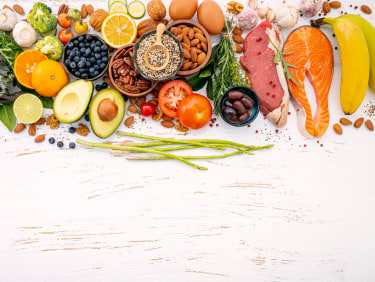
Diet Counseling
Diet Counseling
Diet counseling is the process of treating kidney diseases with good nutrition and a healthy diet. Specifically, the kidneys are responsible for removing waste products from your blood. However, damaged kidneys can no longer filter harmful waste products, which start accumulating in your blood. This can make you feel sick or fatigued, causing other health problems further down the line.
To avoid this situation, a diet counselor prepares a renal diet for dialysis patients to reduce the amount of toxic waste building up between dialysis treatments. Following a renal diet may also help slow down the progression of kidney failure by promoting kidney function.
During nutritional counseling, your therapeutic nutritionist teaches you the best food choices for your medical condition, based on your medicines, lab tests, and your lifestyle in general.

What to Eat on Your Renal Diet
A renal diet should be low in sodium, potassium, phosphorus, and fluids, with moderate amounts of high-quality protein. You may also need to limit calcium intake, based on the specific condition of your kidneys.
Every patient suffering from kidney disease is different, which is why it is important for you to talk to a diet counselor who can create a renal diet plan tailored to your needs.
Potassium
Damaged kidneys can find it difficult to remove potassium from your blood. As a result, the potassium levels in your blood can get higher than usual, leading to cardiac arrest, muscle weakness, and even death. Therefore, it’s vital to limit the amount of potassium in your diet by:
- Choosing fresh fruits and vegetables that are lower in potassium, including apples, carrots, peaches, green beans, and wheat cerealsLimiting potassium-rich foods, such as kiwis, oranges, tomatoes, beans, potatoes, avocados, and bananas
- Draining canned fruits and vegetables before eating them
- Restricting milk and dairy products to 8 oz per day
- Avoiding salt substitutes, which can be rich in potassium
Sodium
Since kidney disease does not allow your kidneys to adequately expel excess sodium and fluids from your body, your renal diet should be low in sodium. You can monitor your sodium intake by:
- Eating fresh food more often
- Replacing salt with herbs, spices, and sodium-free or low-sodium seasonings
- Using hot pepper sauce, lemon juice, and other alternative seasonings
- Cooking food at home from the start, instead of choosing prepared, frozen, or canned foods (that are high in sodium)
- Thoroughly rinsing canned food with water before eating
- Keeping away from processed foods
Phosphorus
It can be difficult to limit food with phosphorus, as the same food contains much-required protein. Even so, here are some tips to keep your phosphorus levels within a safe range:
- Pick fresh meats and other packaged foods without added phosphorus
- Eat fresh fruits and vegetables
- Avoid dairy foods, nuts, lentils, oatmeal, fish, and beans
- Choose rice, rice milk (not enriched), rice cereals, breads, and corn
Unfortunately, dialysis or a diet alone might not be able to keep your phosphorus levels down easily. In that case, your nephrologist or renal nutrition counselor may prescribe a phosphate binder that you need to take with meals.
Protein
Protein helps your body produce waste that your kidneys remove. The more protein you take, the harder your kidneys may have to work to move out the waste produced.
The proper amount of protein to be consumed differs with each stage of the disease for CKD patients. You need to eat the right combination of protein foods for your specific stage of the disease, according to your renal nutrition counselor or nephrologist.
- Eat low-fat and low-phosphorus meats, such as chicken or roast beef
- Consult your renal dietitian to check if you can fit milk (good source of protein, but high in potassium and phosphorus) into your diet

Our Process
At Nephrology Consultants, P.A., you will receive one-on-one diet counseling for kidney disease. Our nephrologists and registered dietitians (RDs) are here to help address any concerns you may have. We can assist you with diet and nutrition counseling by:
- Conducting accurate nutritional assessments for patients with Chronic Kidney Disease (CKD)
- Regular blood check-ups to ensure normal potassium, sodium, and phosphorus levels
- Suggestions for dietary changes to help you meet your sodium, potassium, phosphorus, and protein requirements
- Food plan-building according to your renal treatment plan
Choose the right foods in the right amounts with tailored diet counseling by Nephrology Consultants, P.A. We are present in various locations in Delaware.